Jim Reed - An American Cultural Treasure BanjoCrazy.com Exclusive
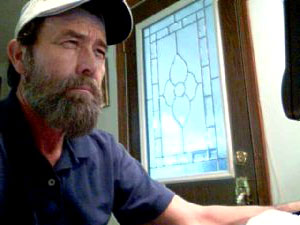
Paul Roberts interviewed Jim Reed in 2012
Jim Reed is one of the most authentic and artistic banjo players of our time. Born and raised in Kentucky, Jim has played 5-string banjo since he was a child. An inspiring musical leader, Jim Reed is a living link to the essence of mountain music. His smooth picking and nuanced phrasing make for an uncommonly beautiful banjo sound.
Four banjo-playing friends of Jim - Don Borchelt, Janet Burton, Don Couchie and Donnie Gill - have written tributes to Jim Reed. Preceding the interview are extracts from those tributes, the full text of which you can read here.

Janet Burton
I’m privileged to know Jim Reed through Banjo Hangout, the online international community of pickers. Jim is Banjo Hangout's living link to old-time and bluegrass roots. He's the real deal - raw talent, musically raised by friends and neighbors in a mountainous area of southeastern Kentucky. Encouraged at age 5 to play banjo by his dad, Jim has picked banjo with his family and the best pickers and fiddlers, many familiar to us all. He could have gone pro, but chose a miner's life over 42 years ago. On the Hangout, Jim's videos and MP3s are a precious resource to learn hundreds of tunes that - at 61 years old - his fingers rattle off spontaneously, just for fun. We all look forward to his next musical post and they're truly gems.
Jim's kind-heartedness and willingness to share his skills are apparent throughout the Banjo Hangout Forums, especially ‘Sound Off!’ Jim is known for his warm encouragement and sense its authenticity. And if he really likes you, he may write a song just for you. Now, that's the best gift a friend could give!
Don Couchie
As a young boy playing music with his father and brothers and surrounded by some of the finest musicians in Eastern Kentucky, Jim was raised with the finest music one could hope to hear. He has allowed this music to become part of his soul and it is apparent in everything he plays. Jim always has own personal sound and he always contributes some of his own philosophy into the music. Jim's repertoire consists of modern and traditional bluegrass music, old-time traditional fiddle tunes, and original banjo compositions that draw heavily on traditional music. Many of these original tunes are named after the many friends that Jim has made in Banjo Hangout over the years.
Don Borchelt
Jim is what they used to call a ‘natural.’ I could pick Jim out of a festival full of pickers, as could anyone who has been listening to his playing for any length of time. He likes to cover the well-worn old tunes we've heard for years, but they are sown with little subtle differences, whispered musical surprises, that make them bloom all over again… Jim's picking is a gift, pure and simple… I started noticing that in that smooth quiet style, he was doing some very unusual moves, and even when I slowed down some of his music postings to try to figure out what he was doing, some of his licks remained a complete mystery to me.
Throughout his picking, Jim employs a subtle vocabulary all his own. He often embeds his slides, hammers and pull-offs in places within his rolls where we don't expect to find them, even though they sound right at home when he executes them. He seamlessly integrates his Scruggs style rolls and Keith/Thompson style melodic phrasing, so that you can't tell exactly where one technique ends and another begins. Like the early bluegrass pickers who were still rooted in traditional Appalachian music, Jim is not afraid to retune his banjo, but when he does, he still knows the neck from the nut to the twenty-first fret every bit as well as he does in standard open G.
Music has always been a part of Jim's life. His father was a clawhammer picker, and his brothers also play music. Jim grew up picking with fiddlers like Owen "Snake" Chapman, who lived in Canada, Kentucky, just a few miles east on Rt. 119, and Paul David Smith, who lived in Hardy, further up Rt. 119, closer to the West Virginia line. Jim played often with both of these legendary eastern Kentucky fiddlers, and if you listen, you can hear it in his banjo picking. Jim picks his banjo the way these traditional men played their fiddles, with an archaic crookedness that you don't hear from the pickers like Scruggs and Reno whose music is rooted in the more burnished traditional music of western North Carolina.
Donnie Gill
Jim had many offers to go on the road and play for some big named bands and that was just not what he wanted to do. He is a family man and did not want to be away from those that he loved and wanted to stay close to. Jim has a very interesting way of teaching those around him about life. Anyone that has met him is drawn to him and wants to be exposed to as much of his teachings as possible. He is a true mountain man and lives the life that most would want.Jim gets up very early and prepares to go to work in the coalmines, which he has done for over 40 years. He stops by his mother’s house ever day for coffee and a visit each and every morning. He has told me about his mother and how she cooks these great home cooked meals for whoever comes for a visit. She is 81 years young and has more spunk than most people will ever know. Jim’s wife, Phyllis, shared with me, that Jim’s mother is where he gets his fire and lively attitude. She is as tough as they come and is a real example of a great woman who has lived sharing many of her riches with everyone around her. She has educated many with her old-time sayings and mountain ways and is a real pleasure to just be around.

The Interview
Paul: Jim, you live in the mountains of Kentucky, the birthplace of bluegrass music.
Jim: I have lived here all my life. I live on Reed Hollow Road in Sidney, Kentucky in the mountains of eastern Kentucky, in the coalfields. I was born in my dad’s old home place, not in a hospital, and I was delivered by a country doctor named Doc Jed Smith.
Paul: I understand you grew up surrounded by lots of musicians.
Jim: Yes, there were a lot of musicians who played lots of music here. I guess you could say I was born to music. Around here, you shake a tree and a banjo picker would fall out. My dad played and there were six of us boys and we all played music from banjo, guitars and fiddle to dobro and bass. Every Saturday night we had friends come to my Dad’s place and play music all night long. I have had the greatest experience of playing and meeting lots of folks throughout my life and if I had it to do all over I would do it again. I have gained a lot knowledge from music all those years by the lifestyle I lived. Some of my friends who also played music with me growing up are Paul David Smith, Jim McCown, Owens “Snake” Chapman, Lester Baldwin, Tommy West, Tommy Chapman, Art Stamper, Tom McCown, Bert Hatfield, Emmit Smith… dang, I could go on and on.Two of my brothers have passed away and the ones who are left play very little. I guess I’m the only one that’s still active in music.
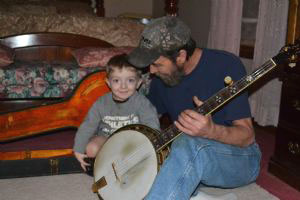 Paul: How did you get started on the banjo?
Paul: How did you get started on the banjo?
Jim: I was five years old when I first started trying to play the thing. My dad’s mom - my grandmother - would let me play with my dad’s ole Bacon banjo while he was working. It didn’t have a case and he left it setting at the fireplace of our old home place. She would hum or sing a tune to me, but she’d say, “Don’t you tell your dad.” She thought he would get mad, but one day my dad heard me playing a little tune with right-hand two and three-finger rolls.
I thought he would whip me for fooling around with his banjo, but it made him happy.
He said, “Son, you are sounding good. What is the name of that tune?”
I said, “Dad, I call it g-bag. I made it because I don’t know no other tunes.”
We went outside on the porch and he said, “Mom, I want you to listen to this boy trying to pick.”
“Clarence, I know. I have been letting him play with it and I sing some songs for him. That little fellow will play that thing, I think.”
He was so happy that I was trying to play the banjo.
My dad played clawhammer style on a Bacon banjo that had lots of mother of pearl on the headstock and a skin head. He would sit on the front porch and play clawhammer style. Some of the tunes were Chewing Gum, Run Little Rabbit Run, Eight More Miles to Louisville, Ol’ Walking Cane. He would go around singing all the time even while he was working. My dad passed away when I was 24 years old.
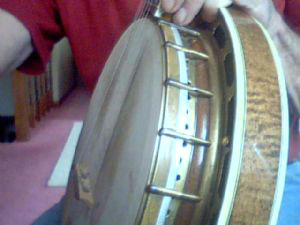 Paul: Who taught you to play? Who did you listen to and how did you develop your own style?
Paul: Who taught you to play? Who did you listen to and how did you develop your own style?
Jim: As far as who taught me, I guess no one did. My dad played clawhammer banjo, but got excited about me learning to pick with my fingers at five years old. Of course, the first I listened to was Earl Scruggs - then, Don Reno, Ralph Stanley, Bobby Thompson, Bill Keith, and so on. That kind of influenced me, but I didn’t want to play like them.
I wanted my own style that would be different, so I worked on that. I really try to put notes in a tune that’s a little different, or take an old tune and spice it up some. I think the sound is just the way I pick and most of my rolls are pretty steady. Plus, I play a pre-war banjo, too; that makes a lot of difference. I’ve always played Gibson banjos. I guess you could say I’m a Gibson man. I try to play older tunes and put something a little different in it.
Paul: You also compose a lot of tunes, often in honor of your friends. Creating tunes seems easy for you.
Jim: As for making tunes up, it’s just something that I can do without any effort. It is natural for me to pick up the banjo and come up with something. I think that it is really a gift, so it’s no problem for me to make a tune, just natural. The bottom line is I just love the banjo and all kinds of tunes. I always explore the neck of the banjo and all kinds of rolls that I make myself. I can’t read tab. With tab, I’m like a lost duck in a pond full of geese.
Paul: Can you remember any musical experiences as a child that helped you as you were learning to play?
Jim: I know one thing for sure. Paul David Smith and Owen “Snake” Chapman had more to do with my playing than anyone. It was all fiddle tunes and their great playing and noting. I want to let you know Paul David Smith passed away yesterday, the loss of a great friend. I will be going to the funeral home to pay him my last respects. I’m really sad over this and told my wife just a little while ago that I put Jim McCown and Paul David’s videos on Banjo Hangout yesterday. Why I did that, I really don’t know. I had no idea he would be gone today. I’ve thought of this all evening, why I did this without knowledge of Paul’s death. I guess God has his ways of things like this to happen. Paul loved music as much as anyone I know. He won second place on the fiddle at Clifftop just this year. His teaching came from Owen “Snake” Chapman. Paul followed Snake wherever he went to play. I’ve listened to them all night long. Not once did they play the same song twice.
At the time I was about 12 years they started coming to my dad’s house to pick with my dad and my brothers. Of course, I wasn’t really that good, but they heard some sounds that I was playing that fit into their fiddling. They’d mostly played with clawhammer players and hadn’t been around too many 3-finger style pickers.So you can say they took me under their wings and started telling me, ‘we will play this slow, and when we nod our head, you take a break.’ From there, I started playing fiddle tunes on the banjo. They taught me to be smooth and play notes you don’t hardly hear on a banjo. I think that it may be that some of my playing is just because of their experience and patience.
When they heard about the Reed family, all these musicians, one by one, started coming around to my dad’s house - Snake Chapman, Bert Hatfield, Paul David Smith, Jim and Tom McCown, Tommy West, Lester Baldwin, to name a few. This is when Lester and I started playing those fiddle tunes. Lester was also a banjo picker and we started playing those fiddle tunes note for note. At times there would be three fiddlers, three banjo pickers, two or three mandolin players, four or five guitars and a bull bass. Shoot, one guy named Adam Damron played spoons. He was great.
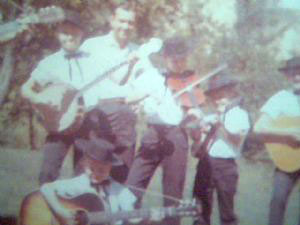 Paul: When did this musical resurgence that your family had such a big hand in propagating, get going in your community? How did it start?
Paul: When did this musical resurgence that your family had such a big hand in propagating, get going in your community? How did it start?
Jim: I think it was around 1964 or ‘65. One thing that got a lot of talk about the Reed family was one of my young brothers, John. Lord, I don’t know how old he was, but he played the doghouse bass. John was so small he would have to stand in a chair to play that thing. Everybody talked about that. We would go to different events at schools, benefits and things of that nature. My dad dressed up like Stringbean and played that old banjo clawhammer style. One tune he always played was Chawing Chewing Gum. Everybody always got a thrill out of that. My dad really put on a show. He would announce his boys are going to play, and everyone enjoyed it.
Paul: Jim, pardon my ignorance, but what’s doghouse bass?
Jim: It’s just a big bass fiddle. Around here, they call them doghouse bass.
Paul: Tell us something of your family's musical heritage.
Jim: The only thing my dad ever told me about my grandpaw was he taught singing school. You know, the ‘do, ray, me’ stuff. Shoot, I never ever tried that, but my uncle Joe Reed could pick up a song book, hum through a tune a time or two, and sing the tune like he knowed it forever.
Paul: Let’s hear some more about your family band.
Jim: Our group was the Reed Brothers. There was Clarence Jr., Ranzie, Jack, John, Doug, my dad and myself. The instruments were guitar, mandolin, fiddle, dobro, banjo, doghouse bass, French harp, spoons, and a moonshine jug my dad would play lots of times. My oldest brother was about 14, Ranzie was about 12, I was about 11, Jack about 10, John about 8, Doug about 6. My dad was 54 when he passed away. We brothers kept the music going on his behalf.
Later, when I was about 15, I played on a TV station in Huntington, West Virginia. The show was called the Buddy Starcher show. This was not with my family but with a friend of ours.
Paul: Any funny stories from your early days as musician?
Jim: One time while my cousin Johnny Mike Reed and I were going to a festival, and of course we were drinking beer like any younger person would do, my cousin must have not been driving very good because a Virginia state trooper pulled us over. When he walked to the truck with his hand on his gun, he said, “You gentlemen please exit the truck, hands on your head please.” Well we did just that. He looked in the truck and there were beer cans on the floor board. He said, “Looks like you guys have had a few - maybe too many.” He asked where we were going. I told him were going to Ralph Stanley’s festival. He said, “Do you have anything to play?” I said, “Yes, behind the seat.” Well, he said, “Who plays?” I said, “I do.”So, he said “Okay, if you can pick that banjo without making a mistake, I’ll let you go.” That was easy for me. I picked Cripple Creek and dropped right straight into Sally Goodin. He said, “That’s good. I believe you are in better shape than your friend here. I’m going to let you two go. On one condition.” He told me to drive, and he said, “I’m working the festival there this weekend and I’m going to follow you boys there until you get through the gate, and when you two get ready to leave I will be watching for you, and I had not better catch you drinking on my highway.” So, we got by with that, but we were sweating it. I’ve got a few more stories, Paul, but you wouldn’t be able to print them.
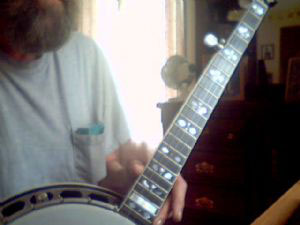 Jim: I have to let you know the story behind the pre-war Granada that I play. I met a guy named Jacky Ray, from Swords Creek, Virginia. He and I played a lot of tunes over the years. He’s a great musician. At the time, I think I was about 23 or maybe 24, I was playing a Fender Concertone banjo, a good 5 string. One weekend I was at Jacky’s. I said, “Jack, I would love to have one of those pre-war banjos.” He said, “You would?” and I said, “Yeah buddy.” Well, the following weekend he called me up and said, “Can you come up here this weekend?” I said, “Yeah, I’ll be there.” When I got there he said, “I got something to show you,” and he sure did.
Jim: I have to let you know the story behind the pre-war Granada that I play. I met a guy named Jacky Ray, from Swords Creek, Virginia. He and I played a lot of tunes over the years. He’s a great musician. At the time, I think I was about 23 or maybe 24, I was playing a Fender Concertone banjo, a good 5 string. One weekend I was at Jacky’s. I said, “Jack, I would love to have one of those pre-war banjos.” He said, “You would?” and I said, “Yeah buddy.” Well, the following weekend he called me up and said, “Can you come up here this weekend?” I said, “Yeah, I’ll be there.” When I got there he said, “I got something to show you,” and he sure did.
He had a 1925 Granada (the one I play now), a 1926 Granada, a 1928 RB4, and a 1928 RB6. He said, “Look, I want to keep the RB4 and the RB6. You can have your pick of other two.” Jack knew I loved the 25 model. I said, “Jack, I can’t take your banjo.” He said, “You are not taking my banjo, it’s yours. You and that banjo belong with each other. That banjo was made for you and you for it, so my friend it’s yours to keep forever.” That’s when I really started to explore the neck of the banjo, and today I still do.
Paul: Tell us more about how you compose your tunes.
Jim: Many, many nights I have woke up at 2 or 3 in the morning with a tune in my head that I can’t get rid of, so I have to get up and play that tune. My wife will wake up and say, “My God, honey we are trying to sleep here. You will wake everybody up.”
Paul: Tell us about some of the musicians you have played with.
Jim: The first time I played with Doyle Lawson and Bill Emersion was at Fedscreek grade school. The Country Gentlemen were putting on a show there and someone had told them about me, so they looked me up there and we picked a bunch before and after the show.Jimmy Martin was doing a show here in Pikeville Kentucky and the fellow who was putting on the show called me and asked me to fill in because his banjo picker couldn’t make it.
Doyle Lawson, Keith Whitley and I were jamming at a festival; I can’t think where it was at the moment and who all else was there.Also, I was at a festival in Bristol Tennessee and was jamming there when John Hartford invited me to his bus to pick. I swear we picked all day long. He gave me his home phone number and I still have it.
I got to know Ben Eldridge and Tom Gray at a festival in Wise County Virginia. I was picking with some other folks and they just loved a tune I was playing called Mary, and that started our friendship. I always see Ben every year and chat with him. If he has time he will say, “Get that banjer and pick me one.”
Paul: Have you played with many bands?
Jim: Yes, I have played in a lot of different bands, mostly as a fill-in when they were short of a banjo player.
Paul: Tell us about your job offer from Bill Monroe to play in The Bluegrass Boys.
Jim: I was at a festival with Kenny Baker who lived only about an hour drive from me in Jenkins, Kentucky. Kenny was an old miner, who had worked for Beth Energy Coal Co. Kenny ran a coal-loading machine. I had been to Kenny’s home before he went to play with Bill Monroe. Kenny and I and some others were playing some old fiddle tunes. I was in my 30’s at this time.
Well, Bill Monroe was standing there listening to the music. He asked me my name and I told him. He said, “Son, would you be interested in playing banjo in my band?” I told Bill that I was really honored, but I didn’t want to play for a living. He asked why and I told him I made more money in the coalmines, which was more than what he paid. Kenny and I had talked, and he told me when you wasn’t playing a show that Bill had you work on his farm. Well, I done enough of that growing up.
Bill Monroe would just travel around the festivals looking for talent. I think that’s how he picked the musicians out for his band. At the time, the money wasn’t much, and I made more money working in the coalmines. I think a lot of musicians played for fame, but that just didn’t interest me.
Paul: What about your job offer to play with the Country Gentlemen?
Jim: I was pickin’ at Ralph Stanley’s festival one year in McClure, Virginia - just a jam with different folks. I was playing Sailor’s Hornpipe. I don’t know where Charlie Waller came from or how long he had been there, but he said he really liked that tune. He was offered a guitar to play and he sat down and sang some tunes. We played for a good while and he really enjoyed himself, and I did too.
He said, “My bus is over here, and I would like to invite you over.” Well, I went and he fixed a mixed drink of some kind. He told me - and I will never forget it - “Jim, I have been on a 30-day drunk.” It didn’t seem that way to me, but that’s what the man told me. He asked if I would be interested in playing with his group. I said, “Charlie, thanks a lot, but I make good money working in the mines, and you have a great banjo picker already.” He said, “Well, I’ll make him drive the bus, and if you don’t want to play in my group, you can stick that computerized banjo up your ***.” I don’t know how you could print that, but that was the words Waller told me. He didn’t get mad at me but I was surprised at what he said.
It seems to me those folks who play for a living and don’t get their way, or have power to achieve their goals, they just don’t like it, and that’s the very reason I turn them down. You know they can’t boss me around. What is theirs is theirs and what’s mine is mine.
Jim Reed Interview page 2 Tributes to Jim
BanjoCrazy.com © 2011 all rights reserved

Donnies Way Home
Wild Wood Flower
Jim Reed's mp3's
|
||
Sail Away Ladies & Sally Ann |
||
| Home Sweet Home | ||
 Jim Reed - An American Cultural Treasure
Jim Reed - An American Cultural Treasure
Jim Reed’s smooth picking and nuanced phrasing make for an uncommonly beautiful banjo sound. Jim Reed is a living link to the essence of mountain music.
